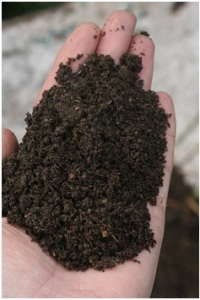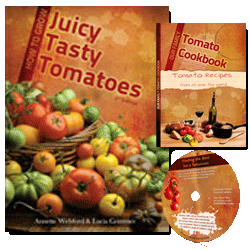How to Make Compost
27 Jan

Credit: wisemandarine
Adding compost to your soil is an effective way to improve the quality of your homegrown tomatoes. And it’s easy to make compost yourself.
Compost Heap or Compost Bin?
A bin looks tidy, and can help prevent small animals from breeding in your compost. However, a closed bin will make it more difficult to aerate your compost. If you opt for a bin, try to find one with air vents on each side.
While a heap can be messy, it is does cause organic materials to break down faster. It’s common to stagger 3 compost heaps: one ready to use, another decomposing, and a final heap to add to.
How to Make Compost
Ensure your compost bin is open top and bottom, with the bottom in contact with soil in your garden. You’ll also need a fitted lid for the top.

Credit: szczel
Greens are high in nitrogen, and include fruit and vegetable scraps.
Create a layer (10-15cm) of twigs at the bottom of your compost bin. This will help ventilate the compost as it begins to decompose. Now you can begin adding organic matter.
There are two kinds of matter you can add to your compost bin or heap: greens and browns. Greens are high in nitrogen, and are living. Greens include vegetable scraps and garden waste. Browns are high in carbon, and are dead. Browns include dry leaves, straw, twigs and dead grass.
You’ll need to balance the greens and browns; make alternating layers of greens and browns, starting with two different layers of greens. Continue with two different layers of browns, and finish with a layer of compost or good soil. Secure the lid to keep the compost warm, and to protect it from the sun and rain.
Continue adding layers of greens, browns and soil to your compost bin. Compost that is ready to use will have an earthy, sweet smell. Remember to always wear gloves when handling compost.
Extra Tips on Making Compost
- Chop everything up as fine as you can. This will speed up decomposition.
- Aerate compost mixture regularly by turning it over. Without air, the mix can become anaerobic. It will smell bad and can become too acidic to use.
- Don’t add meat, fats, citrus skins or onions.
- Keep the mixture damp. Too wet and there won’t be enough air in the mix, and too dry and decomposition will be very slow.
- Keep your compost bin in a semi-shaded area. Full sun can cause the compost to become too hot for earthworms. No sun will make the compost too cold.
If you’d like more information on creating compost or growing delicious tomatoes, grab our best-selling book How To Grow Juicy Tasty Tomatoes.










